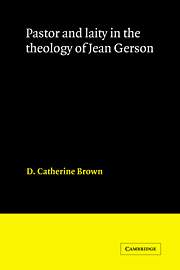Book contents
- Frontmatter
- Contents
- Preface
- List of abbreviations
- INTRODUCTION
- 1 GERSON'S LIFE
- 2 THE ART OF THE PREACHER
- 3 THE ROLE OF THE PASTOR
- 4 THE MEANS OF SALVATION
- 5 THE ANALYSIS OF SIN
- 6 THE MYSTICAL WAY
- 7 WOMEN, MARRIAGE AND CHILDREN
- 8 DOCTOR CHRISTIANISSIMUS ET CONSOLATORIUS
- Notes
- Bibliography of works cited
- Index
8 - DOCTOR CHRISTIANISSIMUS ET CONSOLATORIUS
Published online by Cambridge University Press: 20 October 2009
- Frontmatter
- Contents
- Preface
- List of abbreviations
- INTRODUCTION
- 1 GERSON'S LIFE
- 2 THE ART OF THE PREACHER
- 3 THE ROLE OF THE PASTOR
- 4 THE MEANS OF SALVATION
- 5 THE ANALYSIS OF SIN
- 6 THE MYSTICAL WAY
- 7 WOMEN, MARRIAGE AND CHILDREN
- 8 DOCTOR CHRISTIANISSIMUS ET CONSOLATORIUS
- Notes
- Bibliography of works cited
- Index
Summary
One could detach from Gerson's thought as a whole a number of views and then label him – illicitly – a ‘forerunner’ of the Protestant Reformation. The views one chose to select would, of course, depend on what one saw as the essential features of the Reformation – a matter by no means settled yet. Gerson certainly did present a number of opinions that would find echoes in one or another of the sixteenth-century Protestant movements. He spoke out against papal absolutism; he was a critic of speculative scholastic theology and of clerical corruption. He attacked monastic elitism and was firm in his belief that the life of Christian perfection was possible in all estates. He not only wrote works of spiritual guidance for the laity, but opened the mystical way to them. He praised marriage and he exalted family life. If his doctrine of justification, involving as it did human co-operation with divine grace and the pursuit of holiness, was not Lutheran, it nevertheless resembled that held by some of the Anabaptists. Despite the revolutionary nature of sixteenth-century Protestantism, many of the components that went into its making were already present in the rich complexity of late medieval religious life. Gerson's teaching was part of that rich complexity, so it is not at all surprising that he expressed some views that became part of the Protestant tradition.
Gerson's pastoral teaching taken as a whole leaves a different impression. If the essence of the Reformation, at least in its early stages, is viewed as a ‘revolt against the Roman clergy as an entrenched estate’ – and this is the view now gaining currency – then Gerson's position seems essentially traditional.
- Type
- Chapter
- Information
- Pastor and Laity in the Theology of Jean Gerson , pp. 252 - 256Publisher: Cambridge University PressPrint publication year: 1987

